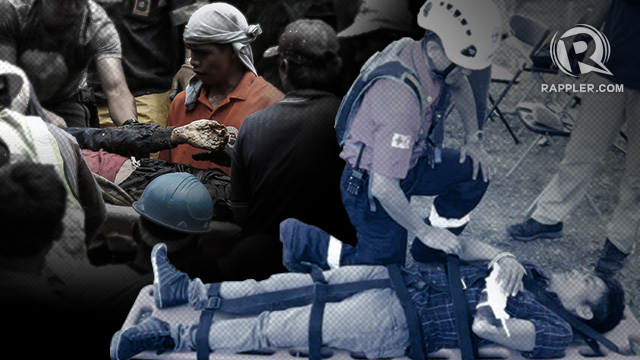
MANILA, Philippines – Although the Philippines faces an average of 20 typhoons a year, only 36% of Filipinos feel they are completely prepared for disasters, according to a study by the Harvard Humanitarian Initiative (HHI) DisasterNet Philippines.
HHI's study is the first nationwide household survey of disaster preparedness in the Philippines. It was conducted from March to April 2017, with 4,368 adult respondents nationwide. The organization shared its findings to media in early February this year.
The HHI study also shows that nearly 47% claimed to have done nothing to prepare for a natural hazard in the last 5 years.
The figure is even less for Filipinos who feel they are sufficiently insured for natural disasters – only 17%. These involve life, health or medical, home, and asset insurance.
"Even though many Filipinos have experienced property damage as a result of disasters, there were negligible levels of reported property insurance. This is a significant gap requiring attention by government and the private sector," HHI said in its study.
Those who did prepare cited experience with previous disasters as a primary motive for preparations. Others were spurred to do so because of television or radio announcements, and their own awareness that they have yet to develop adequate skills to deal with disasters.
Barriers
The United Nations Office for Disaster Risk Reduction describes populations vulnerable to disasters as those who are more susceptible to the impacts of hazards.
The HHI pinpointed numerous vulnerable populations such as those living below the national poverty level and informal settlers in coastal or flood-prone areas.
While vulnerable populations can invest in disaster preparedness, this becomes a problem when people may not have enough resources to cover even basic needs.
Though most Filipinos feel self-reliant when it comes to disasters, the HHI study shows that 74% are unable to invest in disaster preparedness. (READ: Time to prepare that disaster kit)
Income is the biggest hurdle, as 47.5% of Filipinos cited inadequate funds as a barrier preventing them from better preparing for disasters. Majority do not have cash, medicines, first-aid kits, food, and drinking water at home in case of disasters.
But if given adequate funds, majority would opt to strengthen their homes and buy provisions to keep at home. (READ: How to prepare when disaster and emergency strike)
Communication
According to HHI, phones and diesel generators may be beneficial in disaster management. Phones, especially, can be used to receive early warning messages or locate family and friends, as 90% of Filipinos reported owning a mobile phone. Diesel generators, meanwhile, can be used to maintain power during blackouts. However, only 2% of Filipinos own one.
Another detail worth noting is that the Philippines has widespread access to various communication technologies. Majority own a mobile phone, at least one or more televisions, and radios. On the other hand, only 12% own a personal computer.
Still, with the country having access to various means of communication, there are many opportunities for informing people about disaster preparedness. At the national level, for example, 82% of the population get their main source of news from television, followed by radio.
Long way to go
Even with strong coping mechanisms learned throughout the Philippines' long history of experience with disasters, there's still a long way to go. Significant gaps remain in ensuring households feel and are prepared for disasters.
HHI pointed out that one of the biggest gaps identified in the research lies in mental health, as a significant portion of the population impacted by disasters expressed difficulties going through trauma. Less than 1% reported having access to mental health services or being treated for mental health issues.
With the survey, HHI aims to provide information that might help officials and planners see the Philippines' strengths and weaknesses in disaster preparedness and resilience. It also aims to point out the gaps which future measures can focus on.
Interestingly, HHI's study saw that only 14% of Filipinos feel they could influence decisions made in their communities by local leaders.
"How Filipinos understand their own exposure to these hazards and the steps they take to cope with them is crucial to formulating relevant national policy and planning," HHI Resilient Communities Program director Vincenzo Bollettino said in a statement last Tuesday, February 5.
HHI said that the Philippines "is, and will continue to be, a key focus and area of study on disaster resilience and preparedness."
"With the anticipated changes in weather patterns and sea level rise associated with global climate change, researchers and policymakers will benefit from continuing to examine how Filipinos cope with and prepare for future disasters," it added. – Rappler.com